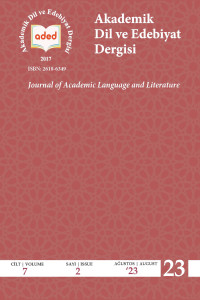Abstract
One of the most important writers of Turkish literature Latife Tekin’s novel called Berji Kristin, Tales From The Garbage Hills focuses on the construction and destruction processes of the people of Çiçektepe at the mentioned place “Çiçektepe”. The people of Çiçektepe wants to live their own tales but they come across with obstacles of the state powers and natural disasters; the houses which were built collapse at every turn. At the end of their struggle, it is permitted to live in their houses. In this quarter where the people interiorize a collective way of living, after overcoming all the problems, a factory is established and adopting a working order which all the people work together enable us to come to the forefront utopian thought. There is a close link between having the neighborhood resident always hope and the hope principle of utopian thought. On the other hand, both the demolish of the houses which people were built and power struggle of some people from the neighborhood resident are the reflections of dystopian thought. In this study, by being focused on the relations between “Berji Kristin, Tales From the Garbage Hills” and utopian and dystopian thought, the opposite case in one novel will be analysed within the scope of events, facts and concepts. It is evaluated through the turning points which utopia transforms to dystopia and dystopia transforms to utopia. To the extent that this dual perspective allows, the points where the narrative deviates will be determined and evaluated. In this context, the concept of "ustopia" introduced by Margaret Atwood will be mentioned and the view of the concept in practice will be exemplified. The concepts of utopia, dystopia and ustopia will be evaluated within the framework of the text and will be explained with quotations from the text.
References
- Atik, Ş. (2012). Türk Edebiyatında Postmodernist Süreç ve Latife Tekin, Ankara: Bilge Kültür Sanat.
Abstract
Türk edebiyatının önemli yazarlarından olan Latife Tekin’in Berci Kristin Çöp Masalları (1984)adlı eseri, esere konu olan mekânda, Çiçektepe’nin insanlarının yaşadığı inşa ve yıkım süreçlerine odaklanır. Çiçektepeliler kendi “çöplükler”inde kendi masallarını yaşamak isterken devlet güçlerinin engellemeleri ve doğal afetlerle karşılaşırlar; inşa ettikleri evler sürekli olarak yıkılır. En sonunda mahallelinin inşa ettikleri evlerde yaşamalarına müsaade edilir. Kolektif bir yaşamın benimsendiği mahallede tüm sorunlar aşıldıktan sonra bir fabrika kurulması ve birlikte çalışmanın esas alındığı bir çalışma düzeni oluşturulması ütopya düşüncesinin öne çıkmasına olanak sağlar. Mahallelinin gelecek güzel günlere yönelik umudunu sürekli taze tutuşu da ütopya düşüncesinin umut ilkesi ile yakından ilişkilidir. Öte yandan, gerek inşa edilen evlerin yıkılması, gerekse süreç içerisinde mahalle halkından bazılarının iktidar mücadelesine girişmesi de distopik düşüncenin yansımalarıdır. Bu çalışmada, Berci Kristin Çöp Masalları adlı eserin ütopya ve distopya düşünceleri ile kurduğu bağlara odaklanılarak, tek bir eserde görülen iki zıt durum; olaylar, olgular ve kavramlar çerçevesinde ele alınacaktır. Ütopyanın distopyaya, distopyanın ütopyaya dönüştüğü kırılma anları üzerinden yazarın çoklu bakış açısı değerlendirilecektir. Bu ikili bakış açısının imkân verdiği ölçüde anlatının sapma yaptığı noktalar belirlenecek ve değerlendirilecektir. Bu bağlamda Margaret Atwood’un ortaya koyduğu “üstopya” kavramından bahsedilerek kavramın uygulamadaki görünümü örneklendirilecektir. Ütopya, distopya ve üstopya kavramları metnin kendi çerçevesi içerisinde ele alınarak metinden yapılacak alıntılarla açıklanacaktır.
References
- Atik, Ş. (2012). Türk Edebiyatında Postmodernist Süreç ve Latife Tekin, Ankara: Bilge Kültür Sanat.
Details
| Primary Language | Turkish |
|---|---|
| Subjects | Modern Turkish Literature in Turkiye Field |
| Journal Section | Articles |
| Authors | |
| Publication Date | August 30, 2023 |
| Submission Date | July 5, 2023 |
| Acceptance Date | July 23, 2023 |
| Published in Issue | Year 2023 Volume: 7 Issue: 2 |
This work is licensed under Attribution-NonCommercial 4.0 International


